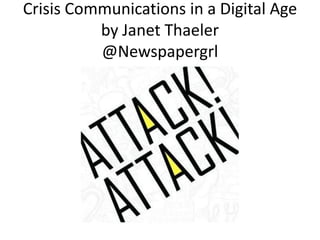Presentation Crisis Communications
- 1. Crisis Communications in a Digital Age by Janet Thaeler @Newspapergrl
- 2. Social Media can Start Revolutions!
- 3. Say Goodbye to the 24-Hour News Cycle
- 4. Say Hello to the 30 Second News Cycle
- 5. Impact of Bloggers ŌĆó Often give analysis and insight to news. ŌĆó Break stories that mainstream media then report on. ŌĆó Opinionated ŌĆó Form strong loyalties and networks that can rival mainstream outlets.
- 6. Example: Cooks Source Magazine
- 7. Bloggers Shut Down Magazine ŌĆó In less than 24 hours, a list of the magazine's advertisers was generated and the advertisers contacted, with secondary campaigns begun to reward advertisers who had pulled their ads from the magazine. ŌĆó The hashtags #buthonestlymonica and #crookssource went viral on Twitter ŌĆó Cooks Source's web hosting company, Intuit, experienced an outage on November 4, prompting speculation that a denial-of-service attack aimed at Cooks Source may have been the reason. ŌĆó The Company shut down completely not long after.
- 8. Point 1: Speed Everything happens at lightning speed. An attack can do damage in minutes, not days. DonŌĆÖt wait a day to respond.
- 9. On Twitter in 4 Minutes Flat Jan 2009 US Airways Flight 1549 crashed into the Hudson River. Emails, tweets, photos and videos of the incident began filtering through cyberspace 15 minutes before the mainstream media even reported it. The first recorded tweet occurred 4 minutes after the incident.
- 10. Point 2: It DoesnŌĆÖt Take a Village One influential person can do considerable damage.
- 11. Attensity Blog Too Fat to Fly ŌĆó Close to 45,000 relevant mentions of Kevin Smith and Southwest Airlines across blogs, microblogs, discussion boards / forums, and online news. ŌĆó 14,000 mentions the day of the incident. ŌĆó 16,000 conversations took place on the 15th. ŌĆó Interest waned after the 16th.
- 12. Point 3: The Network Effect Attacks spread across multiple platforms.
- 13. Point 4: Be Real People demand transparency and detest spin and ŌĆ£corporate speak.ŌĆØ Whatever you do, donŌĆÖt get defensive or be condescending. Example: Nestle Responds to Greenpeace
- 14. BEFORE Crisis ŌĆó Best to be proactive instead of reactive. ŌĆó Have a strong networks established of your own. ŌĆó Assemble a team and plan how and who will respond in case of a crisis.
- 15. Create a Culture of Listening Always monitor and listen online sentiment. Know the culture and the influencers. Free Tools:
- 16. Provide Proactive Customer Service Train staff and empower them to respond to customer complaints before they blow up. Who is really good at this?
- 17. After a Crisis ŌĆó Use dialog to join the conversation and respond. ŌĆó DonŌĆÖt leave your most important communications to an intern. ŌĆó Apologize and ask the offenderŌĆÖs opinion (these are opinionated people!)
- 18. Search Engines Record Everything Respond on the same platform the crisis originated on. If a company has weak search results, an attack is even more harmful. (Scott example) Use optimized press releases and media outreach to tell your side of the story.



















